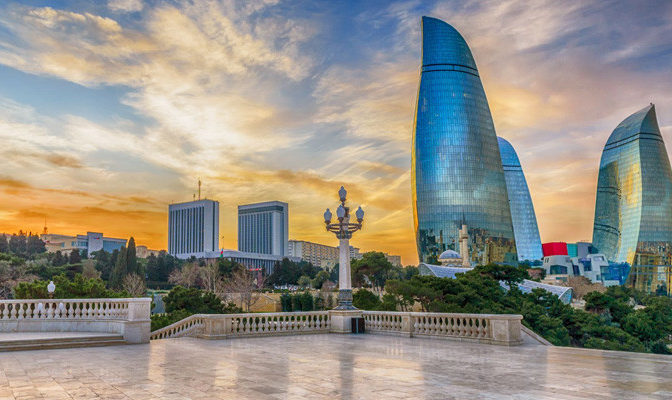
 "
"

 "
"

Azerbaijan is on the verge of becoming a pivotal player in the global Halal industry, thanks to its strategic geographical location and robust infrastructure. Its position at the crossroads of Europe and Asia, combined with modern trade routes and logistics, presents both significant opportunities and challenges for businesses in the Halal market.
Azerbaijan’s strategic location serves as a major logistical asset, acting as a gateway between Europe and Asia. Historically a key player in the Silk Road, Azerbaijan’s geographical legacy continues to benefit the modern global supply chain. The North-South Transport Corridor, connecting Russia, Iran, and India, offers up to 50% faster transit times compared to traditional routes (UNECE, 2022). This, combined with Azerbaijan’s advanced rail and road infrastructure, ensures efficient movement of goods.
The Baku International Sea Trade Port, the largest on the Caspian Sea, handles 15 million tons of cargo annually and is a critical hub that links maritime and land routes.
Implications for Businesses:
Advantages:
Challenges:
Azerbaijan’s Free Economic Zones (FEZs) offer significant advantages for businesses entering the Halal market. Located near major transport hubs, these zones attract foreign investment with tax incentives, simplified customs procedures, and modern infrastructure.
The Alyat Free Economic Zone (AFEZ), near the Port of Baku, is poised to be a central hub for the Halal industry, providing facilities for Halal-certified processing, packaging, cold storage, and logistics. This zone’s location and infrastructure, including advanced IT systems for real-time tracking and automated customs, are ideal for maintaining Halal product integrity.
Implications for Businesses:
Advantages:
Challenges:
The North-South Transport Corridor, linking Northern Europe, Russia, Central Asia, and the Middle East, is a crucial route for Halal industry logistics. It reduces travel distances, lowers costs, and ensures efficient goods movement through Azerbaijan’s extensive transport network.
The Baku-Tbilisi-Kars (BTK) railway, a key component, provides a direct link to Turkey and Europe, minimizing transshipment and cutting transit times.
Implications for Businesses:
Advantages:
Challenges:
Azerbaijan’s role in China’s Belt and Road Initiative (BRI) positions it as a crucial link for Halal trade between China and Europe. The BRI aims to enhance trade across Asia, Europe, and Africa, and Azerbaijan’s location along this route provides efficient access to these markets.
Investments in infrastructure, such as the Trans-Caspian International Transport Route (TITR) and the Baku-Tbilisi-Kars railway, support seamless connectivity between Asia and Europe.
Implications for Businesses:
Advantages:
Challenges:
In summary, Azerbaijan is positioned to become a key player in the global Halal logistics landscape, offering businesses exceptional growth opportunities, efficiency, and market access. However, navigating the associated challenges and leveraging the country’s strategic advantages will be crucial for success in the expanding Halal industry.
Credits to Dr. Firdaus Fanny Putera Perdana for his valuable insights. Discover more about his work https://www.linkedin.com/in/drfirdausfannypp/